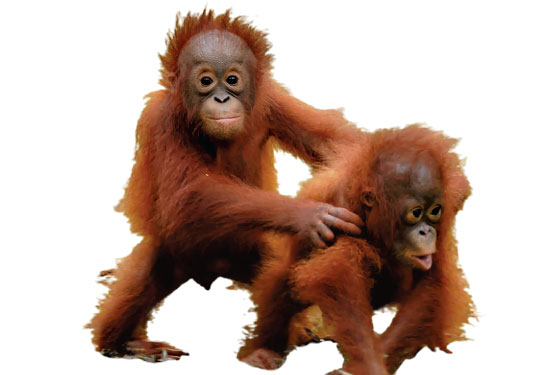
It seemed an inevitability—though no less ridiculous now that it’s come to pass—that innocent animals would eventually get caught up as rubes in the ongoing carnival that is reality television. Apparently, having exhausted the supply of beauties, geeks, biggest losers, average Joes, bachelors, bachelorettes, drunken college students, and kids, television programmers have now turned to orangutans. The latest development in the genre that ate television is Animal Planet’s Orangutan Island, on which orangutans, usually solitary, nomadic creatures, are installed on a small island in Borneo to see if they can “form a society.”
The orangutans were deposited on the protected habitat as part of a conservation project, but the potential of this reality-show setup is not lost on the producers. The promos for Orangutan Island even (forgive me) ape the now-iconic opening sequence of The Real World: “This is the true story of a group of orangutans…” And just like the stock characters on that program—the angry black guy, the gay guy, the girl who gets drunk and kisses other girls—the orangutans have been labeled: Jasmine the Femme Fatale, Saturnus the Clown, Cha Cha the Social Butterfly.
This format has worked for Animal Planet before: The bafflingly successful Meerkat Manor, which just finished its third season and is filming its fourth, is the channel’s biggest hit yet. It follows a family of meerkats, dubbed the Whiskers, in the Kalahari Desert as they go about their daily lives of eating millipedes and procreating.
This season climaxed when Flower, the longtime matriarch of the Whiskers family, was bitten by a snake and died. Her demise sent waves of grief coursing through the hearts of the devoted. Funerals were held, songs composed in her honor, and the show’s producers castigated for not giving her an antivenom. As one message-boarder put it, “I heard the old Pat Benatar song ‘We Belong’ today and just started balling [sic] my eyes [out] on the part where she sings about ‘doing your best to try and watch the family.’ My family and co-workers thought I was nuts to be this upset over her death. Please tell me I’m not alone to still be this upset? When will it start getting easier?”
But aside from the mania of the followers, the main problem with these shows, unlike more traditional nature programs, is that they ascribe human emotions and ethical matrices to animals. Meerkats cannot be “courageous” or “conscientious,” “humiliated” or “somber,” and they certainly cannot be “heroes.” (Also, infant meerkats are not “children.”)
Moreover, the show’s producers create ethical and emotional constructs that invite viewers to take sides when there really aren’t any to be taken. Orangutan Island is invaded by its “menacing neighbors,” which in fact are just another group of orphan orangutans from an adjacent sanctuary. When the Whiskers decide to take over a burrow that is in the territory of a nearby meerkat gang, they are simply trying to find food and stay warm far from home. When the Zappas return to find their burrow occupied and, justifiably, make a stink, they are “the neighbors from hell.” The protagonists are represented as heroes, and the beasts that happen not to be television stars are vilified, when really they’re all just meerkats, doing what meerkats do. No wrong. No right. Just meerkat.
Essentially, these are the plots of children’s books overlaid on footage of actual animals behaving like animals, which is fine for children but just pablum for adults. Is our craving for narrative structure so intense—and our sense of drama so impoverished—that we have to resort to anthropomorphizing what are basically South African rat-dogs?
The orangutans, however, may not be so easy to co-opt, precisely because they are quite a bit more similar to humans (they have opposable thumbs, masturbate, etc.). There is a kind of complexity to their personalities—combined with a lack of awareness of the camera that even the dunderheads on reality television don’t have—that makes them much subtler and more difficult to typify than the meerkats. Hamlet, at first portrayed as a bully, plays against type to teach foraging techniques to less experienced orangutans, thus prompting the producers to recast him as a sage elder. But he’ll probably start pushing others around again because he doesn’t know his role. If so, Animal Planet may be confronted with the depressing truth that apes are too real for reality television. Indeed, rebellion may be afoot on Orangutan Island, as Mogok was recently seen exploring a boat. Perhaps, in a watershed moment for both evolutionary biology and reality television, he’ll vote himself off the island yet. Smarter than he looks.